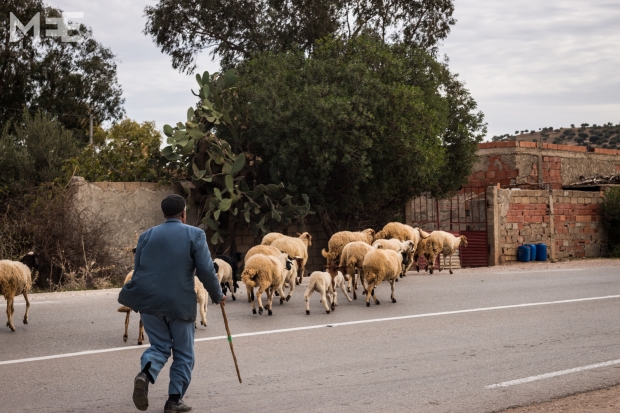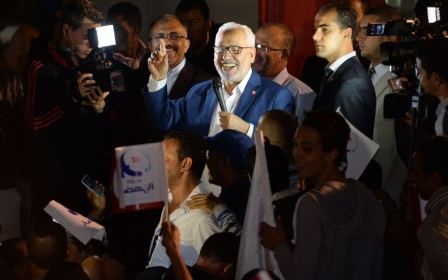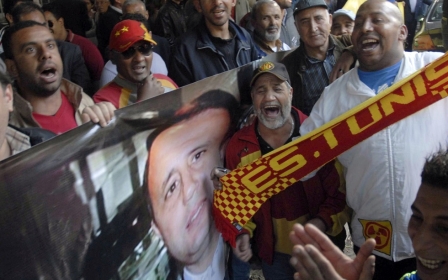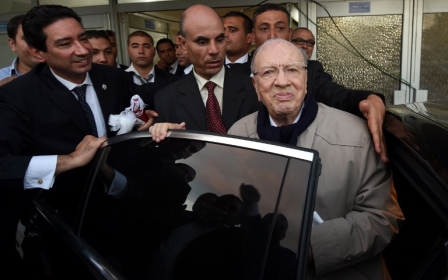Invisible citizens: unrepresented Tunisians in the age of democracy
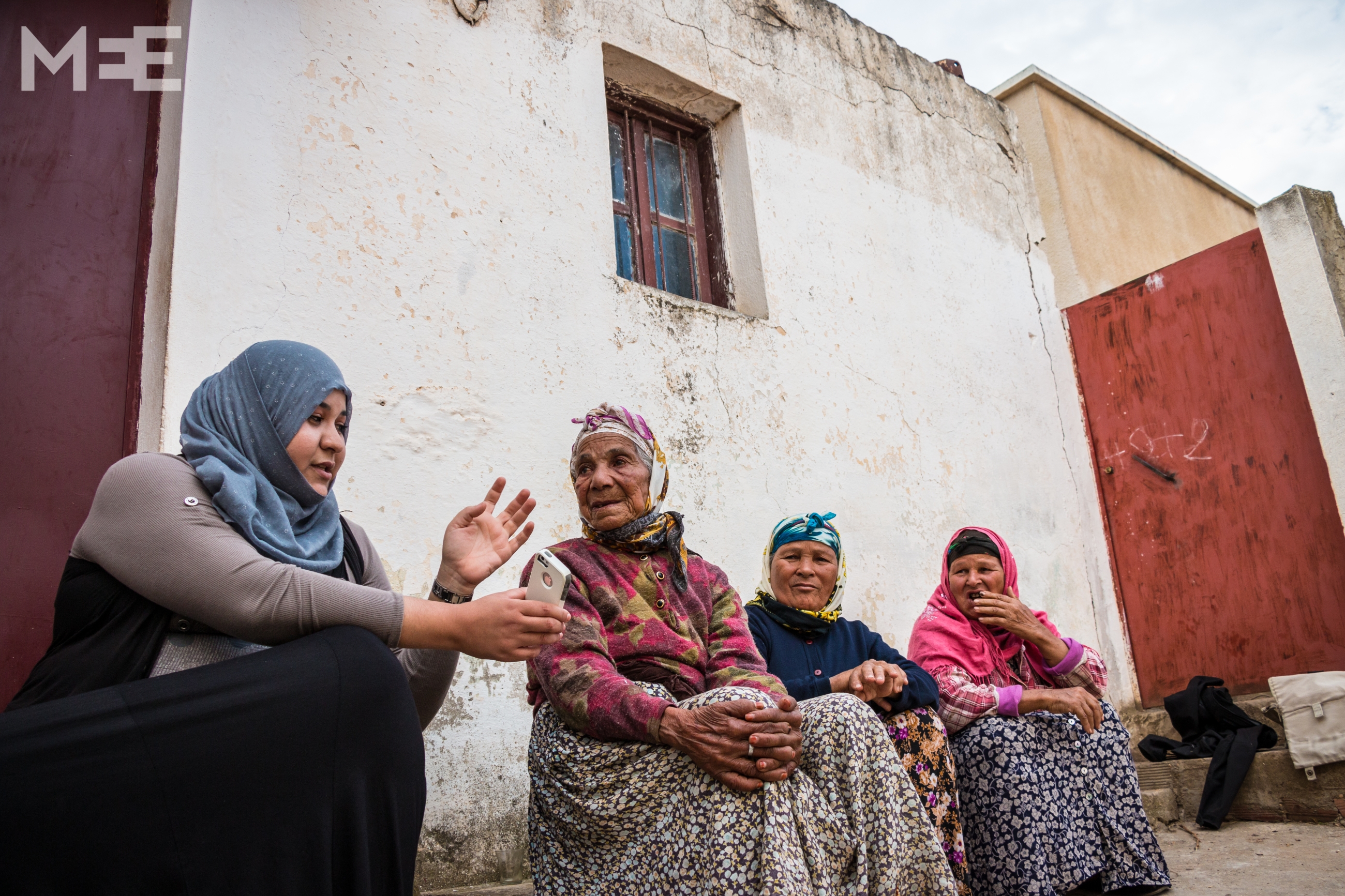
In the village of Essaâda, in northwest Tunisia, a farmer clad in a dirtied blazer runs after his herd of sheep as they bolt across the lone narrow road. Behind the farmer, farmhouses from the French colonial period sag under the weight of their heavy red-tiled roofs. The sky is grey, and wind rushes between the high hills upon which Essaâda is perched.
On the concrete doorstep of one of the humble white homes clustered beside the road, Barkana Ghozwan sits wrapped in a colourful skirt and headscarf. Ghozwan, who estimates her age to be around 80, is one of some 300,000 Tunisians without formal identification who cannot participate in the political transition four years after the uprising that ousted a long-time autocrat. This is no small number in a country with a population of just under eleven million. With no ID, rural Tunisian women like Ghozwan live largely without the rights of citizens, and cannot vote in upcoming presidential elections set to tie off Tunisia’s transition to democracy.
Ghozwan was born in Essaâda. Her parents were poor, she says, making it by hook or by crook working different jobs from day to day. Her husband, who died two years ago, worked as a guard on one of the nearby farms. Ghozwan has five children. Apart from a few visits to her children in Tunis, she’s never left her rural province of Jendouba.
Without so much as a birth certificate confirming her existence, everything from medical insurance cards to voting is off limits for Ghozwan. Her health is failing, perturbed by a frequent cough, but before every visit to the pharmacy she has to work up just enough money to pay for medication, as the state cannot provide insurance without identification. “What is missing in my life? I’m missing everything. I have nothing,” she said.
Though much of Tunisia’s political transition hitherto has unfolded in the halls and ministries of Tunis over 150 kilometres distant, Ghozwan is well aware of the revolution that ousted former president, Zine El Abidine Ben Ali, and the presidential elections set to take place on Sunday. Asked what she would do if she had an identity card, she told Middle East Eye, “I don’t know who to vote for, but I’d certainly vote.”
She has remained patriotic despite never having participated in formal politics. “Even though the state has never thought of me, I’m a Tunisian citizen,” Ghozwan added.
In September, Chafik Sarsar, president of the High Independent Authority for Elections (ISIE), announced that 300,000 Tunisians would be unable to vote in Tunisia’s parliamentary and presidential elections. He said that much of the blame for ID-less Tunisians being left out of the political process falls on policies of the former Ben Ali regime. “State policies of the previous regime left many marginalized, without proper infrastructure and very limited financial resources - no roads to their villages, and a minimal income,” he said. “This made it difficult for them to get IDs in the first place.”
Sarsar also pointed to a tight timeframe as a principle reason ISIE wasn’t able to do more to include marginalised Tunisians in the process. He noted that ISIE was only formed in January of 2014 after the hotly contested constitution that had been in drafting for more than two years was adopted. Stating that ISIE only discovered the presence of large numbers of ID-less Tunisians during the first voter registration period in June, Sarsar said in defence of ISIE, “We were limited by time. Registration was going to end. We couldn’t put everything off in order to fix this problem.”
In future elections, Sarsar noted that large government ministries with greater capacity will be making efforts to get official identification in the hands of Tunisia’s vulnerable - most often rural women - so they’ll be able to vote. “The Ministry of Social Affairs and the Ministry of Women’s Rights are going to take over on the issue going forward.”
Despite his optimism for future inclusiveness in the nascent democracy, Sarsar admitted that the oft touted success story of the Arab Spring has much further to go. “If there are still [Tunisians] out there without ID cards who can’t participate as citizens, then something in the democratic transition is missing,” he said solemnly.
Speaking on difficulties ISIE faced in finding and registering those without ID, Monica Marks, an independent researcher and analyst on Tunisian politics, echoed Sarsar. She said that since its creation, ISIE has indeed been burdened by time constraints. Further, she noted, tremendous bureaucracy and outdated communication protocols have hampered communication between government ministries - just what would be needed for the state to focus efforts to find and register Tunisians in isolated communities.
“Very little about how things are done in [government] ministries has changed since the revolution,” said Marks. “Bureaucracy is stopping government workers from communicating with others down the hall,” adding that orders transferred between different offices in the same ministry are still communicated by fax.
Yet, where government institutions have fallen short, youth organisations are trying to fill the gap. After the breaking of Ben Ali’s one party-led police state in 2011, those outside the circles of party elites were given an opening to participate in local politics and social issues. As a result, the last four years have seen a surge in civil society activity, even in historically neglected areas like Ghozwan’s rural province of Jendouba.
The Future Generations Association is one such example. Founded in January of 2013, the organisation is composed of and run by young women, many from rural communities like Essaâda. The activists of Future Generations organise awareness and training activities around elections, and collect local demographic information that is sometimes overlooked by national institutions.
In a discussion with Middle East Eye during an elections forum in Jendouba, Future Generations activists described what they saw as some of the obstacles to registering rural women. Raja Khmissi, 27, pointed out that, “Husbands who are controlling their wives can be a big obstacle. They marry the woman young and don’t want her to leave the house. She can’t go into town to go shopping, much less go vote in elections.”
For Wafa Afaya, 29, the gravest obstacle facing rural Tunisian women is the lack of interest by political parties often most concerned with their coastal urban electorate, reflective of longstanding divisions between Tunisia’s seaboard and interior regions. “The political parties aren’t going out to the isolated villages. If they do, they only campaign out there a day or two before elections,” she said exasperatedly.
Further, Afaya said, “A woman may get to the polls and see the ballots and say ‘Who do I vote for?’ She may not have a developed idea of who the candidates are.” Ayafa added that she believes it is the responsibility of parties and candidates to hold public forums in rural areas to raise awareness around the particulars of their platforms.
For those in Ghozwan’s village of Essaâda, the political transition underway in Tunis can seem far away. The lack of substantial change for the better here has led to nostalgia for the past among some. At mention of the coming presidential elections, Ghozwan’s neighbour Aziza said wistfully, “Ah the old days of Ben Ali. He was good. We haven’t seen anything good from the ones that have come since.”
Middle East Eye propose une couverture et une analyse indépendantes et incomparables du Moyen-Orient, de l’Afrique du Nord et d’autres régions du monde. Pour en savoir plus sur la reprise de ce contenu et les frais qui s’appliquent, veuillez remplir ce formulaire [en anglais]. Pour en savoir plus sur MEE, cliquez ici [en anglais].


